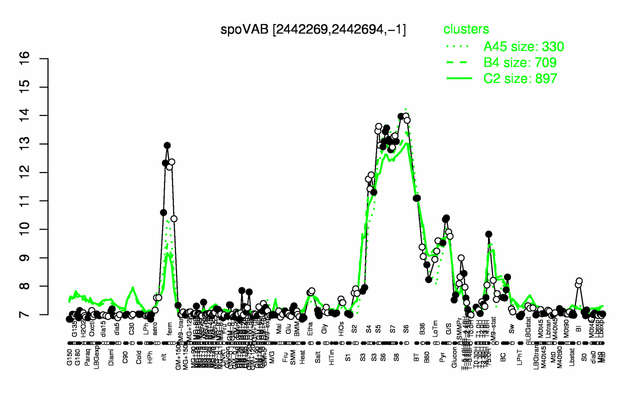Difference between revisions of "SpoVAB"
(→References) |
(→References) |
||
| Line 141: | Line 141: | ||
=References= | =References= | ||
| − | <pubmed>3114420,11751839,15451103,3926949,17158659,6432957,,7934830 15699190,1903432,8755877 22328679, 21398556 </pubmed> | + | <pubmed>3114420,11751839,15451103,3926949,17158659,6432957,,7934830 15699190,1903432,8755877 22328679, 21398556</pubmed> |
[[Category:Protein-coding genes]] | [[Category:Protein-coding genes]] | ||
Revision as of 08:21, 12 June 2013
- Description: essential for the uptake of the 1:1 chelate of pyridine-2,6-dicarboxylic acid (DPA(2,6)) and Ca(2+) into developing spores, required for spore maturation
| Gene name | spoVAB |
| Synonyms | |
| Essential | no |
| Product | unknown |
| Function | spore maturation |
| Gene expression levels in SubtiExpress: spoVAB | |
| Metabolic function and regulation of this protein in SubtiPathways: Lys, Thr | |
| MW, pI | 15 kDa, 10.125 |
| Gene length, protein length | 423 bp, 141 aa |
| Immediate neighbours | spoVAC, spoVAA |
| Sequences | Protein DNA DNA_with_flanks |
Genetic context 
This image was kindly provided by SubtiList
| |
Expression at a glance PubMed
| |
Contents
Categories containing this gene/protein
sporulation proteins, membrane proteins
This gene is a member of the following regulons
The gene
Basic information
- Locus tag: BSU23430
Phenotypes of a mutant
Database entries
- DBTBS entry: [1]
- SubtiList entry: [2]
Additional information
The protein
Basic information/ Evolution
- Catalyzed reaction/ biological activity:
- Protein family:
- Paralogous protein(s):
Extended information on the protein
- Kinetic information:
- Domains:
- Modification:
- Cofactor(s):
- Effectors of protein activity:
- Localization:
- cell membrane (according to Swiss-Prot)
Database entries
- Structure:
- UniProt: P40867
- KEGG entry: [3]
- E.C. number:
Additional information
Expression and regulation
- Additional information:
Biological materials
- Mutant:
- Expression vector:
- lacZ fusion:
- GFP fusion:
- two-hybrid system:
- Antibody:
Labs working on this gene/protein
- Peter Setlow, University of Connecticut Health Center, USA
Your additional remarks
References
Yunfeng Li, Andrew Davis, George Korza, Pengfei Zhang, Yong-qing Li, Barbara Setlow, Peter Setlow, Bing Hao
Role of a SpoVA protein in dipicolinic acid uptake into developing spores of Bacillus subtilis.
J Bacteriol: 2012, 194(8);1875-84
[PubMed:22328679]
[WorldCat.org]
[DOI]
(I p)
Guiwen Wang, Xuan Yi, Yong-qing Li, Peter Setlow
Germination of individual Bacillus subtilis spores with alterations in the GerD and SpoVA proteins, which are important in spore germination.
J Bacteriol: 2011, 193(9);2301-11
[PubMed:21398556]
[WorldCat.org]
[DOI]
(I p)
Venkata Ramana Vepachedu, Peter Setlow
Role of SpoVA proteins in release of dipicolinic acid during germination of Bacillus subtilis spores triggered by dodecylamine or lysozyme.
J Bacteriol: 2007, 189(5);1565-72
[PubMed:17158659]
[WorldCat.org]
[DOI]
(P p)
Leif Steil, Mónica Serrano, Adriano O Henriques, Uwe Völker
Genome-wide analysis of temporally regulated and compartment-specific gene expression in sporulating cells of Bacillus subtilis.
Microbiology (Reading): 2005, 151(Pt 2);399-420
[PubMed:15699190]
[WorldCat.org]
[DOI]
(P p)
Venkata Ramana Vepachedu, Peter Setlow
Analysis of the germination of spores of Bacillus subtilis with temperature sensitive spo mutations in the spoVA operon.
FEMS Microbiol Lett: 2004, 239(1);71-7
[PubMed:15451103]
[WorldCat.org]
[DOI]
(P p)
Federico Tovar-Rojo, Monica Chander, Barbara Setlow, Peter Setlow
The products of the spoVA operon are involved in dipicolinic acid uptake into developing spores of Bacillus subtilis.
J Bacteriol: 2002, 184(2);584-7
[PubMed:11751839]
[WorldCat.org]
[DOI]
(P p)
I Bagyan, J Hobot, S Cutting
A compartmentalized regulator of developmental gene expression in Bacillus subtilis.
J Bacteriol: 1996, 178(15);4500-7
[PubMed:8755877]
[WorldCat.org]
[DOI]
(P p)
V Azevedo, A Sorokin, S D Ehrlich, P Serror
The transcriptional organization of the Bacillus subtilis 168 chromosome region between the spoVAF and serA genetic loci.
Mol Microbiol: 1993, 10(2);397-405
[PubMed:7934830]
[WorldCat.org]
[DOI]
(P p)
B Moldover, P J Piggot, M D Yudkin
Identification of the promoter and the transcriptional start site of the spoVA operon of Bacillus subtilis and Bacillus licheniformis.
J Gen Microbiol: 1991, 137(3);527-31
[PubMed:1903432]
[WorldCat.org]
[DOI]
(P p)
J Errington, J Mandelstam
Use of a lacZ gene fusion to determine the dependence pattern and the spore compartment expression of sporulation operon spoVA in spo mutants of Bacillus subtilis.
J Gen Microbiol: 1986, 132(11);2977-85
[PubMed:3114420]
[WorldCat.org]
[DOI]
(P p)
P Fort, J Errington
Nucleotide sequence and complementation analysis of a polycistronic sporulation operon, spoVA, in Bacillus subtilis.
J Gen Microbiol: 1985, 131(5);1091-105
[PubMed:3926949]
[WorldCat.org]
[DOI]
(P p)
J Errington, J Mandelstam
Genetic and phenotypic characterization of a cluster of mutations in the spoVA locus of Bacillus subtilis.
J Gen Microbiol: 1984, 130(8);2115-21
[PubMed:6432957]
[WorldCat.org]
[DOI]
(P p)